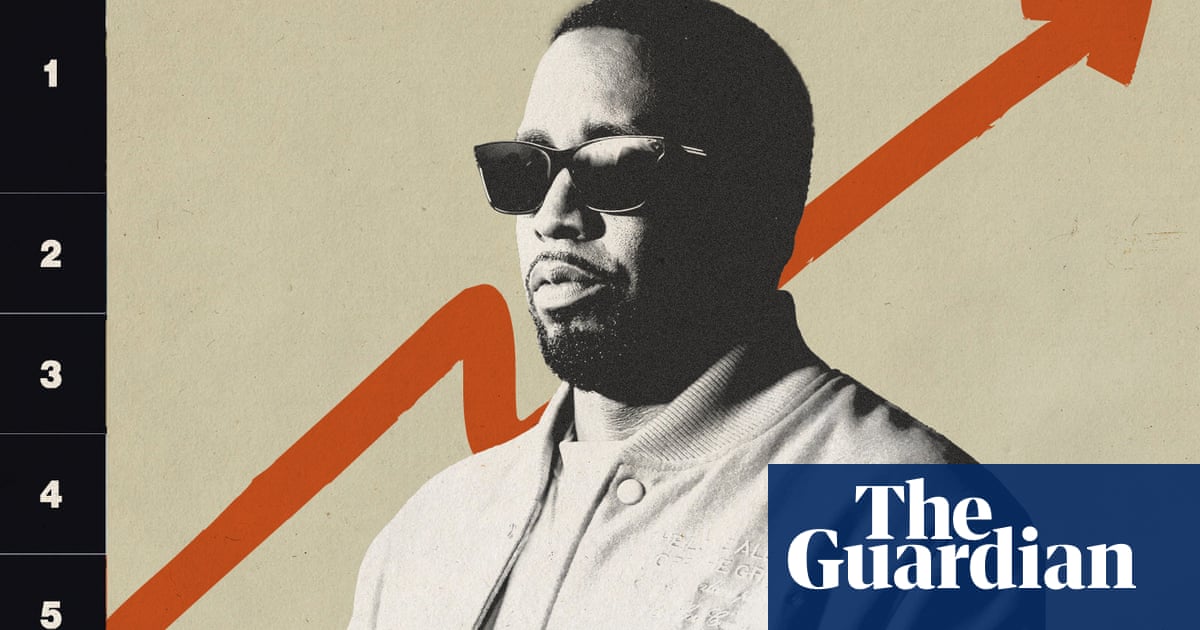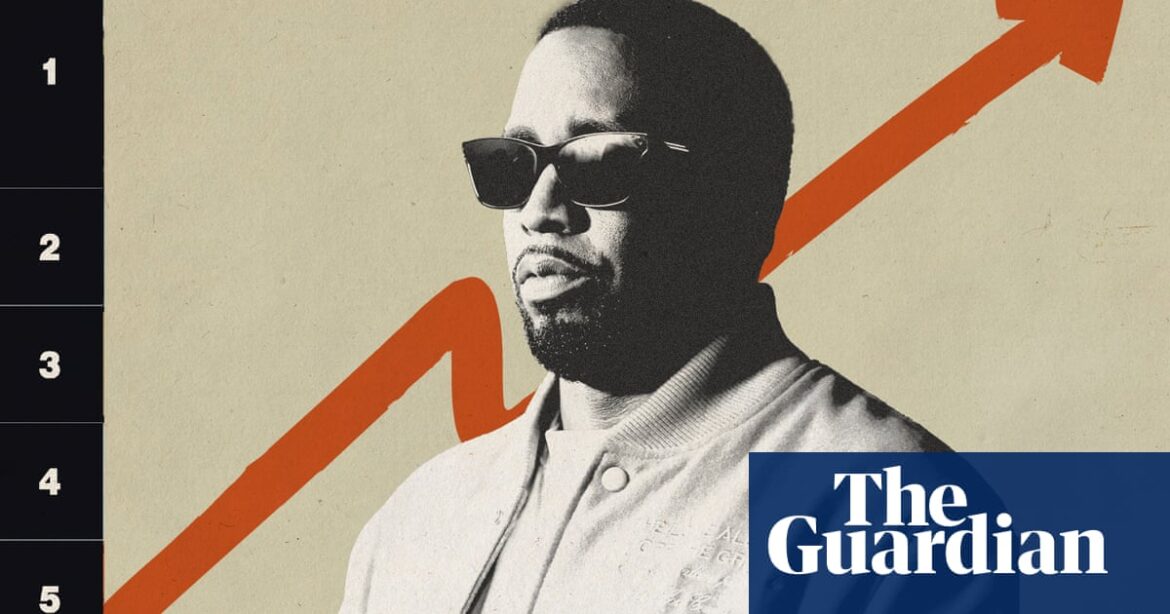
In the past few years, powerful men within the music industry – the singer R Kelly, the Def Jam founder Russell Simmons and the Guns N’ Roses frontman Axl Rose – have faced public outcry after sexual violence allegations against them surfaced. But in many cases, streams of these artists’ music have remained largely unaffected, sometimes even ballooning in popularity.
The disgraced music mogul Sean “Diddy” Combs is the latest artist to see his music streams sharply increase following public accusations of sexual assault by numerous people, including minors.
Known for decades as a hip-hop impresario, the founder and CEO of Bad Boy Records has lost at least 18 brand partnerships, a reality show deal and other business ventures due to mounting allegations. A video of Combs beating his former girlfriend Cassie Ventura at a California hotel, publicized by CNN in May, fueled even more outrage and calls to hold him accountable.
The backlash reached a fever pitch in September when Combs was arrested and charged with federal sex trafficking and racketeering. He is currently being held at the Metropolitan Detention Center in Brooklyn, New York, with a trial expected to start on 5 May 2025. Combs has pleaded not guilty to all allegations and his lawyers have repeatedly denied any wrongdoing.
Despite the criminal charges, Combs’s monthly listeners on Spotify climbed from 9.6m on 18 September, around the time when news of his arrest became public, to 13.2m a month later, according to data from Chartmetric, which provides music data analytics. Views of Combs’s YouTube channel increased by 7m to 700.1m views during the same time period. Streams of Combs’s catalogue increased by nearly 50%, according to Luminate, a music and entertainment data supplier.
When Surviving R Kelly, a documentary about the singer’s history of sexual violence toward girls and women, first aired in January 2019, his music streams during the same period doubled, reaching over 1.73m streams, according to data from Nielsen Music. Album sales for Kelly, who is currently serving a 20-year prison sentence, increased by 500% after he was found guilty for child sexual abuse.
Problematic artists can see an increase in streaming metrics for multiple reasons, according to experts. Curiosity plays a significant role in boosting streaming, if only temporarily, said Serona Elton, a professor and director of the Music Industry Program at the University of Miami’s Frost School of Music. “People might see the news story and wonder, ‘What kind of music has this person done? Am I familiar with it?’,” she said. Streaming serves as an “exploration” of who Combs is as a person versus “an actual desire to experience the music”, Elton added. Sharp increases in streams inevitably decrease as “marketed-related activities” that push people to explore music, including music being sampled in television or film, drop significantly.
Streaming boosts also occur as people return to an individual’s music to see if it provides any insight into their behavior, said Eric Holt, an associate professor of music business at Belmont University. “There are tons of memes on Instagram and TikTok where [people say], “Oh, this is what [Diddy] was talking about when he said this line or that line,” he said.
Nostalgia might also temporarily drive up engagement, Holt said, particularly the desire to listen to a song “one more time” before no longer engaging with a controversial artist. “[People think], ‘Oh, I still love this song’ or ‘I hate that he was convicted of these things. I’m not going to listen to this, but let me listen to it one more time.’”
But many may be streaming Combs’s music to intentionally support him, said Mel Stanfill, an associate professor of English at the University of Central Florida and an expert on fan behavior.
“There’s probably a swath of people that are trying to support him because they don’t believe the accusations are true.”
Survivors of sexual assault, especially violence committed by “rich and famous people”, are already frequently not believed, said Stanfill. Cultural beliefs that the music industry is inherently “hard partying” can also lead to people assuming that inappropriate behavior is standard and further discredits survivors. Combs’s legal team has also accused those coming forward of lying, said Stanfill. “When you already don’t believe people, and you see story after story after story, it is easy to say, ‘Oh yeah, people are just trying to get some money [out of] it,’” said Stanfill.
Several accusers of Combs have been Black women, an additional factor for why audiences may be willing to overlook allegations against him, said Stanfill. “There’s a racist history of considering Black women as always willing, [which] dates back to slavery in the US. Those sorts of stereotypes and assumptions are probably somewhere in people’s minds, deep down in a not conscious place.”
Sexual violence against Black women is also more easily dismissed and ignored, as seen in the amount of time it took to indict Kelly, despite allegations dating back decades, Stanfill said.
People may also rally around Combs given that Black men have historically faced violence due to false allegations of rape and sexual violence, Stanfill added. “The accusation of sexual violence against Black men has been a way of endangering Black men’s lives, so I think the trauma of that is getting pushed for people, to some extent, but also [the belief that] certain kinds of victims [are] not really victims.”
Any public backlash towards Combs hasn’t led to action from streaming platforms, to date. Some radio stations have stopped playing Combs, Billboard Music reported, with a 25% decrease in his radio play time. But Combs’s music is still available on Apple Music and Spotify, and he still has a YouTube music channel. A YouTube spokesperson said the platform suspended Combs from the platform’s partner program due to “off-platform behavior that is harmful to YouTube’s community”, meaning Combs will not be able to earn money from advertising. Spotify and Apple Music platforms did not return requests for comment.
In Kelly’s case, several radios stations stopped playing his music entirely. In 2018, Spotify and Apple Music stopped promoting Kelly on featured playlists, which they curate, but have kept his music available on the platforms. YouTube removed Kelly’s official channels in 2021, but have allowed his music to remain on the site.
The key difference between radio stations and streaming platforms is a question of whether music from problematic artists is being highlighted by platforms or simply “made available for people to find it”, said Elton. Music played on radio stations represents a “curated programming decision” of what to bring to listeners. “[With streaming], they’re not going to serve them up to you in a playlist, but if you go looking for them, they’re going to allow you to find them.”
The choice to feature abusive artists is an “amoral decision”, said Stanfill, one that companies treat as a “public relations problem” once an artist faces public backlash. “This is something where there’s a public perception issue, and so they might downplay, or de-emphasize someone, but at the end of the day, if it’s going to make them money, that is their utmost concern.”
In the end, the choice to stream Combs is still beneficial to his financial portfolio. Because of the large size of Combs’s catalogue, increased streams could represent hundreds of thousands of dollars in additional income, said Holt.
But, beyond finances, Combs being featured on streaming platforms exposes “new generations” to Combs’s music without information of the allegations facing him, said Holt. “As time goes on, that part of [Combs’s] legacy will probably fade as well. And that’s just the reality of humanity, unfortunately, and also the power of streaming platforms that push the music and don’t push the full context of these artists.”
Source: theguardian.com



